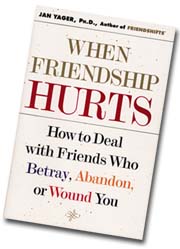|
This is an archived article.
For the latest news, go to the Advance
Homepage
For more archives, go to the Advance Archive/Search Page. |
|
|
Professor's Book Suggests Ways
To Cope When Friendship Turns Sour By Sherry Fisher
That's the finding of Jan Yager, an adjunct professor of sociology at the Stamford campus and an international expert on friendship. Her new book, When Friendship Hurts: How to Deal with Friends Who Betray, Abandon, or Wound You (Simon and Schuster, 2002), offers readers the tools to detect and cope with unhealthy and destructive friendships.
Yager, who has been researching and writing about friendship for the past two decades, says that while having good friends is pivotal to mental and physical health and professional success, 'negative' friendships can be devastating. The book explores how to detect harmful people before they're friends, how to cope with friends who have betrayed, how to handle friendships in the workplace, how early childhood relationships with parents and siblings affect friendships, how electronic communication has changed friendship, and how to end friendships that are not working. Yager says too little attention has been paid to the effects of negative friendships. "While there are dozens and dozens of books that you can find about how wonderful friendship is, few of these address friendships that don't work," she says. "The book has struck a chord with people - men, women, and teens," Yager says. One young woman, whose best friend had dropped her without explanation and was giving her the 'silent treatment', had read the book and contacted Yager to thank her for helping her through a stressful situation. "Friendships that have conflict or end are topics many don't like to talk about," Yager says. "There's a stigma attached in our society to anything that doesn't last, whether it's a marriage that ends in divorce or friendships that don't work out. The myth and the hope is that it should last forever." Betrayal is particularly difficult for people to deal with, she notes. Yager says the book benefits from the research on friendship that she has conducted since 1980, with the most recent study based on responses to 180 surveys about friendship. These include an online questionnaire and both telephone and in-person interviews. Adult men and women and teens from throughout the U.S., India, Japan, South Africa, Denmark, Italy, England, and elsewhere completed the surveys. According to Yager, 68 percent of the people in the study had been betrayed by a friend. She says people often have unrealistic expectations about friendship: "Just as we've learned through research by psychologists and sociologists that expecting a spouse to be everything creates a false expectation for a marriage, expecting a friend to be 'everything' makes it harder to have the friendship in your life." Yager notes that When Friendship Hurts is not just about problematical friendships. "It also delves into the roots of friendship conflicts; jealousy and competitiveness, how much is normal and how much is dysfunctional, issues including when a romantic partner or spouse doesn't like your friends, and more." She says she wrote the book to help people gain insight into why some friendships don't last. She also gives advice on how to choose and keep good friends. Yager received a bachelor's degree in fine arts from Hofstra University, a master's degree in criminal justice from Goddard College, and a Ph.D. in sociology from the City University of New York in 1983, where she held a National Science Foundation pre-doctoral fellowship in medical sociology. She also did a year of graduate work in psychiatric art therapy. Yager's first popular and highly acclaimed book, Friendshifts: The Power of Friendships and How it Shapes Our Lives (1997), drew much attention in the media. Frequently interviewed by broadcast and print media, Yager has appeared on the Today Show, the Oprah Winfrey Show, The View, National Public Radio, and most recently, to discuss When Friendship Hurts on Good Morning America. The book was also written up in the science section of The New York Times on Sept. 10. To read a sample chapter, and for more information about the book, visit http://www.WhenFriendshipHurts.com. |
 he words 'Friends forever' often appear on the
pages of high school yearbooks, but friendships - even the best of
them - sometimes fail.
he words 'Friends forever' often appear on the
pages of high school yearbooks, but friendships - even the best of
them - sometimes fail.
